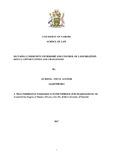/ library resources
Showing items 1 through 9 of 207.Coming two years after a political transition from post-war authoritarianism, this Shadow Report to the United Nations Committee on Economic Social and Cultural Rights is framed in the backdrop of two concurrent processes of ‘transformation’ currently underway in Sri Lanka.
Ownership, use and management of land are highly emotive issues in Kenya and were one of the key drivers of the push for a new constitution. In fact going back in history, this was the main reason for the fight for independence.
Land is the foundation of all human activities both social and economic. This is particularly so in agrarian economies such as Kenya. In these economies women are central to economic production in agriculture and livestock sectors.
2016 was the hottest year on record – the third consecutive record-breaking year.
We, leaders of groups of women affected by the expansion of industrial monoculture plantations, particularly oil palm plantations, coming from all regions in Sierra Leone and different countries from West and Central Africa;
There is wide engagement with large-scale land deals in sub-Saharan Africa, particularly from the perspectives of development and international political economy. Recently, scholars have increasingly pointed to a gendered lacuna in this literature.
Since the onset of the phenomenon of large scale land acquisition for agri-business in Sierra Leone, after the first whistle was blown by Green Scenery, many studies have been conducted by various researchers, some to meet requirements for degree thesis, others for policy and development purposes
Cambodian human rights organizations estimate that more than half a million people have been affected by land rights issues.
Pagination
Land Library Search
Through our robust search engine, you can search for any item of the over 73,000 highly curated resources in the Land Library.
If you would like to find an overview of what is possible, feel free to peruse the Search Guide.







